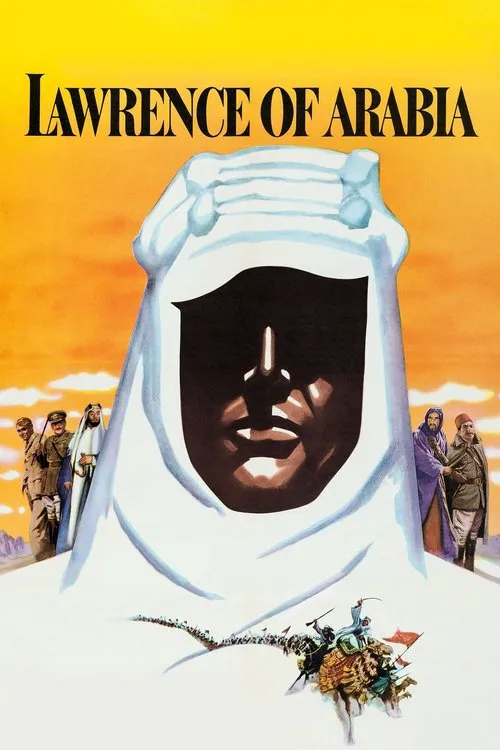Lawrence of Arabia

Plot
The story of Thomas Edward Lawrence, an enigmatic and ambitious British archaeologist and army officer, unfolds in David Lean's epic 1962 film, Lawrence of Arabia. Set against the backdrop of the devastating desert landscapes of Arabia in the early 20th century, the film is a thought-provoking exploration of the consequences of power, loyalty, and self-discovery. The film begins with the somber tone of a military tribunal, where Lawrence's superiors deliberate on his latest exploits. For Lawrence, a 38-year-old archaeologist and officer, his latest scrape lands him in the soup, while also captivating the imagination of the British public. Lawrence's meteoric rise in the Royal Air Force Intelligence has been no secret, but his unconventional approach has also rendered him a bit of a black sheep. Lawrence's character is carefully woven throughout the film, and Peter O'Toole's mesmerizing portrayal brings him to life. We see Lawrence, a seemingly man of untamed elegance and recklessness, whose unwavering compassion and wit make him an instant magnet for his contemporaries. However, as the narrative progresses, we also catch glimpses of his vulnerability, indicating that beneath Lawrence's polished facade lies a reservoir of pain, which pours onto the page like water. Colonel Herbert's efforts to quell Lawrence's increasing popularity amidst the British colonial authorities lead to a tactical shift; he'll be sent on a new mission - blending with the local Bedouin tribes as an Arab chieftain, Auda Abu Tayi's, close associate, to secure the capture of key territory held by the Ottoman forces. Thus commences Lawrence's transformative journey from messianic outsider to an increasingly acclaimed figure. The expedition traverses scorching desert landscapes, rich in metaphor, that bring home the brutal futility of war. The stark contrasting elegance and primitive, harshness simultaneously exemplify Lawrence's complicated predicament. Throughout the expanse of the Arabian landscape, he is met with waves of enthusiasm from disparate tribal leaders who admire Lawrence and seize upon his modernizing ambitions. His persuasive articulation of pan-Arab unity appeals to a multitude of separate-minded families and groups, placing Lawrence as an exalted leader at once detached from but incredibly fundamental to their plight. The dynamic between Lawrence and Prince Faisal, portrayed skillfully by Alec Guinness, sets the stage for a magnificent display of allegiance, loyalty, and selfless ambition that paves the way to numerous pivotal declarations. Confronting harsh criticism and rivalry that rise from many members of the British High Command, Lawrence must fight the battle not only against the Ottoman Empire but also to defy multiple detractors across the line who see the imminent risks in supporting anything but British plans that are in active conflict with Lawrence's seemingly innocent efforts. However, amidst Lawrence's escalating prominence, he is brought low by the blinding horrors of his tumultuous journey across burnt deserts, chaos and murder shatter his mental wellbeing. From inner struggles caused by blurring his emotional, mental and psychological lines with an exhilarated imagination to inner yearning, a sense of disillusionment dawns after Lawrence's trepidations, haunting the film's horizon line where each of us is beset with melancholy loss. The film does not end with great personal glory or resounding triumph, but rather offers a melancholic, paradoxical twist ending where, after surviving multiple brutal battles against an outnumbering myriad of Turkish forces, Lawrence does much to subjugate his pride for the collective victory. Once all along determined, uncomplicated, in an unforgiving search, this compelling tribute to an enigmatic truth master ultimately lets Lawrence escape from desolate death, withdrawing quietly, disillusioned but forever aware of the bitter ironies he had long been trapped in - to live another tumultuous day far away in his eternal and profound isolation from humanity.
Reviews
Elijah
A nobody, perhaps even a figure of fun, can, in a specific environment, transform into a complex figure, a great man. But when he leaves that environment, like a fish crawling onto land only to return to the water, he is drowned.
Aurora
It's truly a perfect five-star film from 1962. I'm withholding that one star to maintain a safe distance between you and this world. This movie is excellent, but not necessarily one you *need* to see, unless you can bear the inevitable loneliness it leaves in its wake. Or perhaps it won't resonate, which is fine too. But once you grasp Lawrence's secrets, once you understand that life is ultimately this – this is all there is – what attitude will you adopt to carry on? If you find yourself in that position, seek to understand Lawrence after Arabia.
Eleanor
Focusing solely on performance in a five-thousand-word review of *Lawrence of Arabia* proved challenging. Ultimately, I extended my analysis to an unexpected area: the camels. It struck me that even the camels delivered remarkable performances. Where one might expect the typical cinematic camel – perpetually chewing and exhaling visible breath – the camels in *Lawrence of Arabia* were different. They possessed a noble bearing, a regal stillness as they stood. Their presence contributed significantly to the film's atmosphere of grandeur and authenticity.
Kamila
This is an era unlikely to produce epics. So, I periodically choose an epic from that bygone age to watch. I steadfastly believe in genuine courage, dreams, and nobility, even though they've been cheapened by those damned reality shows and celebrity gossip.
Recommendations

